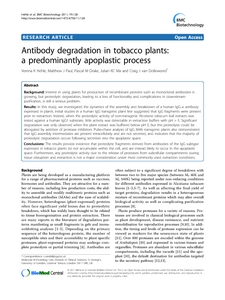Hehle, VK; Paul, MJ; Drake, PM; Ma, JK; van Dolleweerd, CJ
(2011)
Antibody degradation in tobacco plants: a predominantly apoplastic process.
BMC BIOTECHNOLOGY, 11 (128).
ISSN 1472-6750
https://doi.org/10.1186/1472-6750-11-128
SGUL Authors: Drake, Pascal Paul, Mathew John Van Dolleweerd, Craig John
![[img]](https://openaccess.sgul.ac.uk/178/1.hassmallThumbnailVersion/1472-6750-11-128.pdf)  Preview |
|
["document_typename_application/pdf; charset=binary" not defined]
Published Version
Download (1MB)
| Preview
|
Abstract
BACKGROUND: Interest in using plants for production of recombinant proteins such as monoclonal antibodies is growing, but proteolytic degradation, leading to a loss of functionality and complications in downstream purification, is still a serious problem.
RESULTS: In this study, we investigated the dynamics of the assembly and breakdown of a human IgG(1)κ antibody expressed in plants. Initial studies in a human IgG transgenic plant line suggested that IgG fragments were present prior to extraction. Indeed, when the proteolytic activity of non-transgenic Nicotiana tabacum leaf extracts was tested against a human IgG1 substrate, little activity was detectable in extraction buffers with pH > 5. Significant degradation was only observed when the plant extract was buffered below pH 5, but this proteolysis could be abrogated by addition of protease inhibitors. Pulse-chase analysis of IgG MAb transgenic plants also demonstrated that IgG assembly intermediates are present intracellularly and are not secreted, and indicates that the majority of proteolytic degradation occurs following secretion into the apoplastic space.
CONCLUSIONS: The results provide evidence that proteolytic fragments derived from antibodies of the IgG subtype expressed in tobacco plants do not accumulate within the cell, and are instead likely to occur in the apoplastic space. Furthermore, any proteolytic activity due to the release of proteases from subcellular compartments during tissue disruption and extraction is not a major consideration under most commonly used extraction conditions.
| Item Type: |
Article
|
| Additional Information: |
PubMed ID: 22208820
© 2011 Hehle et al; licensee BioMed Central Ltd. This is an Open Access article distributed under the terms of the Creative Commons Attribution License (http://creativecommons.org/licenses/by/2.0), which permits unrestricted use, distribution, and reproduction in any medium, provided the original work is properly cited. |
| Keywords: |
Bioreactors, Blotting, Western, Electrophoresis, Polyacrylamide Gel, Extracellular Space, Humans, Hydrogen-Ion Concentration, Immunoglobulin G, Plant Extracts, Plant Leaves, Plants, Genetically Modified, Proteolysis, Tobacco, Science & Technology, Life Sciences & Biomedicine, Biotechnology & Applied Microbiology, PROTEIN-QUALITY CONTROL, TRANSGENIC TOBACCO, SECRETORY PATHWAY, MONOCLONAL-ANTIBODIES, HYBRID IMMUNOGLOBULIN, RECOMBINANT PROTEINS, ENDOMEMBRANE SYSTEM, HEAVY-CHAIN, EXPRESSION, NICOTIANA |
| SGUL Research Institute / Research Centre: |
Academic Structure > Infection and Immunity Research Institute (INII) |
| Journal or Publication Title: |
BMC BIOTECHNOLOGY |
| ISSN: |
1472-6750 |
| Related URLs: |
|
| Dates: |
| Date | Event |
|---|
| 30 December 2011 | Published |
|
| Web of Science ID: |
WOS:000299215200001 |
  |
Download EPMC Full text (PDF)
|
 |
Download EPMC Full text (HTML)
|
| URI: |
https://openaccess.sgul.ac.uk/id/eprint/178 |
| Publisher's version: |
https://doi.org/10.1186/1472-6750-11-128 |
Statistics
Item downloaded times since 30 Apr 2012.
Actions (login required)
 |
Edit Item |



